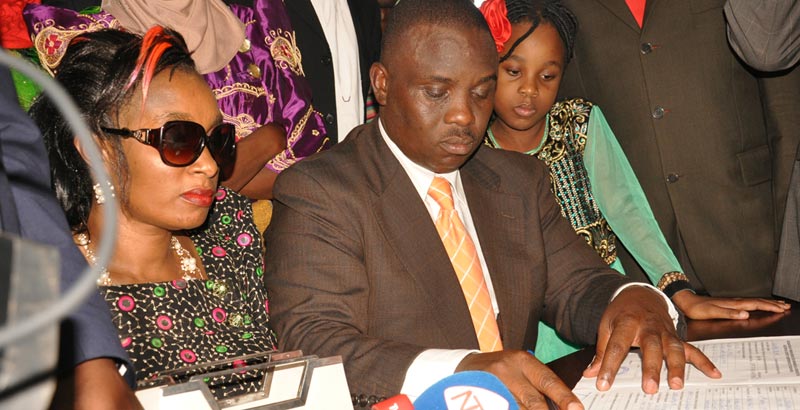News
KCCA bill Boomerang Pushes NRM to Wall
The amendments came amid a volatile environment that has seen the people of Kampala grow angry at the mistreatment of Lord Mayor Erias Lukwago
In a dramatic turn of events, the government was this week forced to withdraw a set of controversial amendments to the Kampala Capital City Authority (KCCA) thanks to pressure from the ruling party councilors.
Prime Minister Dr. Ruhakana Rugunda and the Minister for Kampala Frank Tumwebaze were forced into a highly charged closed door meeting by NRM councilors to KCCA due to mounting public anger that threatened to turn into a protest vote, but also after many discovered the amendments threatened to disqualify many of them.
Most aspiring NRM councilors in Kampala opposed the new amendments on grounds that they threatened to withdraw voters’ constitutionally guaranteed right of choosing the Lord Mayor of Kampala in favour of elected councilors. The amendments had also introduced academic qualifications for district councilors, which effectively threatened to disqualify many of the councillors.
The meeting that was attended by all division Mayors succeeded in forcing the two senior government leaders to capitulate and withdraw the bill. The U-turn was also allegedly informed by a directive by President Museveni.
The U-turn by the government took many political observers and voters by surprise for its inherent contradictions but also for casting the independence of the Electoral Commission in serious doubt.
One NRM councilor who was one of those that negotiated the withdrawal revealed that: “We would rather that Lukwago has his way on this one than throwing out hundreds of our party cadres. This would no doubt weaken our party in favour of our political opponents, especially in the run up to the coming elections.”
He added: “This would cost us men and women with great leadership potential in our local governments who albeit don’t have the senior six qualification as the amendments proposed.” Whereas Ruhindi declined to give reasons for its scrapping, the vigorous reactions and jitters it has caused both within the ruling party and the opposition alike since it was tabled by the Attorney General two weeks ago could tell that it was a matter of time before it is sent down to the gutter.
NRM’s flag bearer for the post of Lord Mayor Daniel Kazibwe popularly known as Raga Dee attacked the bill.
“Bringing such a law after I had for example sweated blood to get elected through my Party’s primaries is tantamount to bringing chaos in the city,” Kazibwe lamented.
Raga Dee added: “It makes it even worse proposing that I have to first become a councilor before I take part in the mayoral race. This is because NRM primary elections for councilors has also closed meaning that one councilor has to lose his slot in the race if room has to be created for me to stand. But this is next to impossible,” he added.
On the other hand, NRM’s Kampala Central Division flag bearer Kibedi Nsegumire contends that raising the academic requirements of all councilors from senior four as required by the current law to senior six is unrealistic.
“It is true that adherents of this amendment argue that some of the councilors even with the qualification of senior four have a problem expressing themselves in English. But if it is the question of the English language, kids as young as six years of age can speak good English and yet we cant elect any of them to any of our councils,” he argued
Kawempe Division Councilor and also the Division’s NRM chairman Godfrey Luwaga faulted the bill for removing the powers of Political leadership in Kampala from the Lord Mayor to the Minister for Kampala, who is also appointed by the President.
“We wouldn’t want to see a situation where the political head of the capital city is an appointee of the president denying Ugandans their right to be represented at local government levels,” Luwaga said.
Rubaga South Member of Parliament Ken Lukyamuzi told The Sunrise that government acted wisely by withdrawing the bill saying that he and other opposition leaders whom he declined to mention were only waiting for it to be passed into law to challenge it in the constitutional court
“Scrapping that bill was the only alternative on the part of the Attorney General because it was sure to be a waste of Ugandans’ time and resources right from the word go,” Lukyamuzi says.
He observes that by denying Ugandans the right to elect their mayors both in Kampala and other local governments is a brazenly defiance of articles 1(2)-(4) and 176 (1) the constitution.
“The people shall express their will and consent on who shall govern them and how they shall be governed through regular, free and fair elections of their representatives or through referendum,” reads 1(4) of the constitution.
Damage done
Despite its withdrawal, some politicians and observers believe NRM has suffered significant damage to its reputation by casting the party as undemocratic and willing to override people’s choices.
FDC presidential contender noted in a Facebook post that: “The Electoral Commission has already made blunders and caused confusion by dancing to the tunes of the dictatorship, its evident they are preoccupied with changing the rules of the game in the middle of the game.”
The amendments came amid a volatile environment that has seen the people of Kampala grow angry at the mistreatment of Lord Mayor Erias Lukwago.
This is evidenced by the rejection of 90percent of all sitting NRM councilors in the party’s recent primaries. Introducing more unpopular laws, some voters have pointed out, enraged many to consider taking out revenge against the party.
Comments



















